How to Clean Billiard Balls
To clean billiard balls, start by gathering your supplies: a 3-4 gallon bucket, mild detergent, and microfiber cloths. Mix 1 part detergent with 10 parts warm water in the bucket. Submerge the balls for 5-10 minutes, flipping them halfway through. Gently scrub each ball with a microfiber cloth, paying attention to stubborn spots. Rinse thoroughly and dry immediately with a lint-free towel. For added shine, apply a small amount of billiard ball polish and buff with a clean cloth. Avoid harsh chemicals, abrasive materials, and prolonged soaking. Regular cleaning and proper storage in a temperature-controlled environment will maintain your balls' appearance and performance. By following these steps, you'll guarantee your billiard balls remain in top condition for years to come.
This post may contain affiliate links. If you make a purchase through these links, I may earn a commission at no additional cost to you. Additionally, portions of this post may be generated using artificial intelligence (AI) technology. While we strive for accuracy, please be aware that AI-generated content may not always be perfect and should be fact-checked when necessary.
The Spatula Scoops
- Prepare a cleaning solution using 1 part mild detergent to 10 parts water in a 3-4 gallon bucket.
- Soak billiard balls in the warm, soapy solution for 5-10 minutes, flipping them midway through.
- Gently scrub each ball with a microfiber cloth, focusing on stubborn spots without using abrasive materials.
- Rinse thoroughly to remove soap residue, then dry immediately with a lint-free towel.
- Polish balls with a specialized billiard ball polish, using a clean microfiber cloth for buffing.
Understanding Billiard Ball Composition
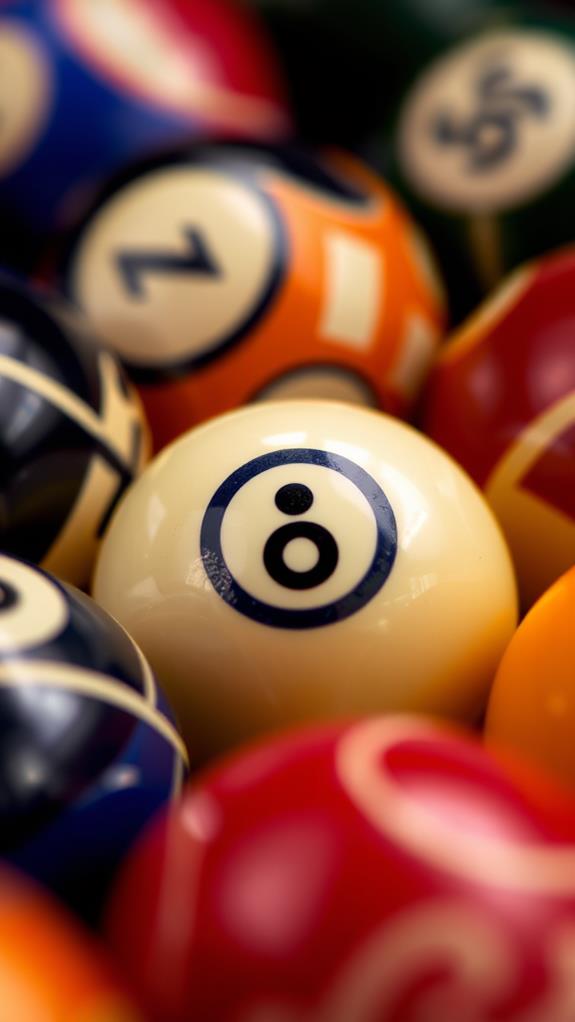
Most billiard balls you'll encounter are made from phenolic resin, a durable thermosetting plastic. This material is chosen for its strength and resilience, making it ideal for the constant impacts and friction billiard balls endure. However, it's important to understand that phenolic resin isn't impervious to environmental factors. Much like cast iron cookware, billiard balls require proper care and maintenance to guarantee longevity and optimal performance.
Over time, exposure to UV light, heat, and oxygen can trigger a chemical process that breaks down the phenolic resin. This degradation causes the balls to gradually turn yellow, altering their appearance and potentially affecting gameplay. While phenolic resin is the most common material, some billiard balls are made from polyester resin. These balls exhibit a different color change pattern over time compared to their phenolic counterparts.
Recognizing the composition of your billiard balls is pivotal for proper maintenance. By acknowledging the susceptibility of phenolic resin to environmental factors, you can take steps to safeguard your balls from excessive UV light and heat exposure. Regular cleaning and proper storage can help preserve the original appearance and playing characteristics of your billiard balls, ensuring they remain in top condition for longer periods.
Gathering Necessary Cleaning Supplies
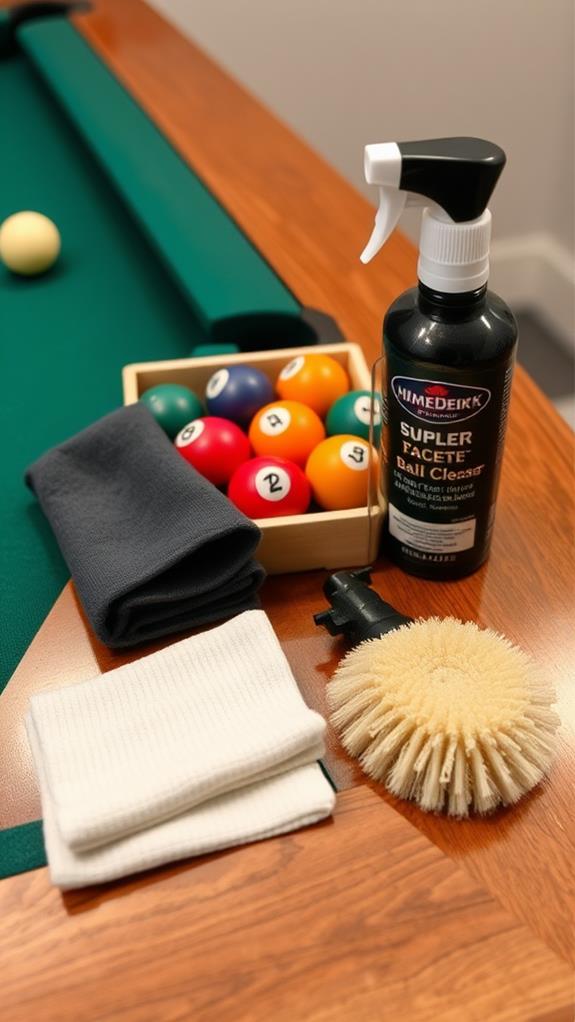
To clean your billiard balls effectively, you'll need to gather some essential supplies. Start by selecting a bucket, appropriate cleaning solution, and soft cloths for drying and polishing. While preparing your cleaning toolkit, consider adding a dual blade peeler for removing any stubborn residue on the balls' surface. You'll also want to choose a suitable detergent that won't damage the balls' surface, and consider additional items like gloves or a soft brush for stubborn stains.
Essential Cleaning Tools
Gathering the right cleaning supplies is crucial for effectively cleaning your billiard balls. To start your ball cleaning process, you'll need a bucket with a capacity of 3 to 4 gallons (11.4 to 15.1 L). This size guarantees you can submerge all your billiard balls comfortably. Fill the bucket about 3/4 full with water, which will provide enough liquid to clean pool balls effectively.
Next, you'll need a suitable detergent. Measure 1 part detergent for every 10 parts of water, ensuring you're using a non-abrasive formula that won't damage your billiard balls. This ratio helps create an effective cleaning solution without being too harsh on the balls' surface.
For the final steps of the cleaning process, prepare two separate towels or rags. One will be used for polishing the billiard balls after they've soaked, while the other should be kept dry for thoroughly drying the balls once they're clean. These tools are essential for achieving a spotless finish and maintaining the integrity of your billiard balls. By gathering these supplies beforehand, you'll streamline your cleaning process and ensure exceptional results.
Choosing Proper Detergents
Selecting the right detergent is essential for cleaning your billiard balls effectively and safely. You'll want to use a mild detergent that won't damage the delicate surfaces of your balls. Avoid harsh household cleaners or abrasive substances that could scratch or deteriorate the ball material.
Your best bet is to opt for a gentle soap and water solution. Mix about one part mild detergent with ten parts warm water in a bucket. Tide or Dawn dish soap are excellent choices for this purpose. These detergents are strong enough to remove dirt and grime but gentle enough to protect your billiard balls.
When choosing your cleaning supplies, look for products specifically designed for billiard ball maintenance. These specialized cleaners are formulated to care for the unique materials used in pool balls. If you can't find billiard-specific products, stick to the mild soap and water mixture.
Additional Helpful Items
The quick brown fox jumps over the lazy dog. When cleaning billiard balls, you'll need a few additional items to guarantee a thorough and effective cleaning process. First, obtain a bucket with a capacity of 3 to 4 gallons (11.4 to 15.1 L) to soak the balls. This size allows for proper submersion and easy handling.
Fill the bucket about 3/4 full with lukewarm water, which will be sufficient to cover the balls completely. To create an effective cleaning solution, measure 1 part detergent for every 10 parts of water. It's vital to use a detergent that's suitable for cleaning billiard balls, avoiding abrasive formulas that could damage their surface.
For drying and polishing the balls after soaking, you'll need a microfiber cloth, rag, or towel. These materials are gentle on the balls' surface and effective at removing excess moisture. When using a damp cloth for initial cleaning, verify it's not overly wet to prevent water from seeping into the balls. Remember to have a dry towel on hand for the final polish, which will help restore the balls' shine and prevent water spots.
Preparing the Cleaning Solution
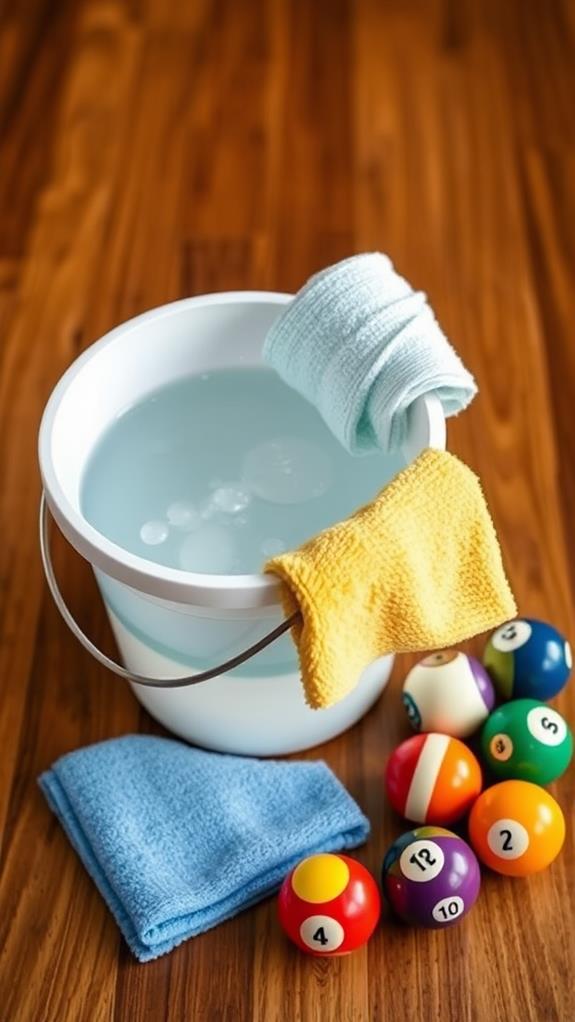
Begin by mixing a suitable cleaning solution for your billiard balls. You'll need a bucket filled with 3 to 4 gallons of water. For every 10 parts of water, add 1 part of an appropriate detergent. It's essential to select a non-abrasive cleaner that's safe for billiard balls, as harsh chemicals can damage their surface and affect gameplay. Consider adding a small amount of pure kosher salt to enhance the cleaning power without introducing additives that could harm the balls.
Once you've measured the water and detergent, stir the mixture thoroughly to guarantee even distribution. This solution will help remove dirt, oils, and chalk residue from your pool balls, restoring their shine and improving their performance on the table.
While the cleaning solution is important, don't forget to prepare other essential items. Have a soft rag or towel ready for polishing the balls after they've soaked in the solution. You'll also need a separate dry towel to remove excess moisture once the cleaning process is complete.
Soaking and Scrubbing Techniques
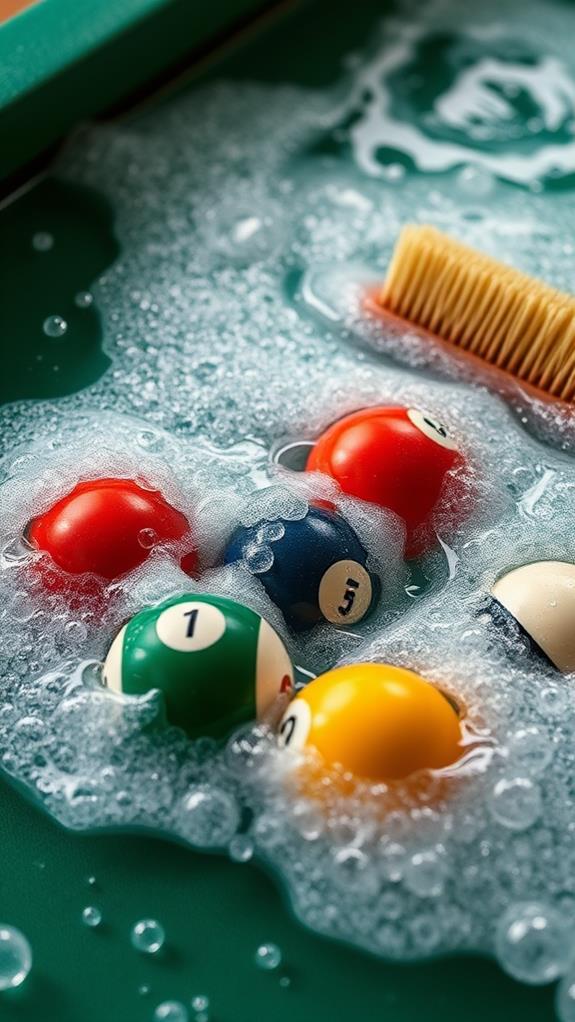
To effectively clean your billiard balls, you'll need to master proper soaking and scrubbing techniques. Start by submerging the balls in a warm, soapy solution for 5-10 minutes, allowing the dirt and grime to loosen. Next, gently scrub each ball with a microfiber cloth, being careful not to use abrasive materials that could damage the surface.
Proper Soaking Techniques
Proper soaking techniques are essential for effectively cleaning billiard balls. You'll need to create a solution of warm water and a mild detergent to begin the cleaning process. This mixture helps loosen dirt and grime without causing damage to the balls' surface. Every time you clean your billiard balls, soak them for 5-10 minutes in this solution. It's paramount to flip them midway through to certify even cleaning.
Effective Scrubbing Methods
After soaking your billiard balls, it's time to tackle the scrubbing process. You'll want to keep using a gentle approach to avoid damaging the balls' surfaces. Create a sudsy solution using mild dish soap and warm water. Dip a microfiber cloth or soft, damp rag into this mixture and gently scrub each ball, paying attention to any stubborn dirt or grime.
Here's a quick reference guide for effective scrubbing:
| Do's | Don'ts |
|---|---|
| Use a microfiber cloth | Use abrasive materials |
| Apply gentle pressure | Scrub too vigorously |
| Focus on stubborn spots | Rush the process |
| Rinse thoroughly after scrubbing | Leave soap residue |
| Dry immediately with a lint-free towel | Allow water to air dry on the balls |
Remember to be patient and thorough during this step. The goal is to remove all dirt and grime without causing any scratches or damage to the balls' surface. If you encounter particularly stubborn spots, you may need to repeat the soaking and scrubbing process. Always rinse the balls thoroughly with clean water after scrubbing to remove any remaining soap residue, which could affect gameplay if left behind.
Drying and Polishing Methods
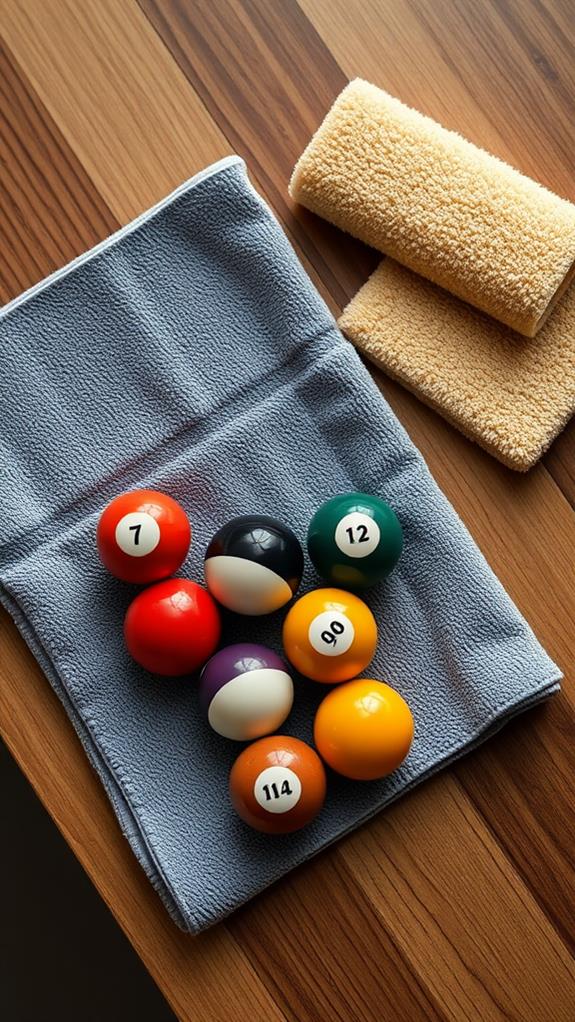
Once you've washed your billiard balls, it's crucial to dry and polish them properly to maintain their quality and appearance. Start by using a clean, dry microfiber cloth to thoroughly dry each ball. This prevents water spots and guarantees no moisture remains on the surface. Next, apply a small amount of billiard ball polish to the dry balls and buff them with another clean microfiber cloth. This step restores shine and smoothness to the balls' surfaces.
For a professional-level finish, consider using a ball polishing machine. These specialized devices utilize pads and solutions to provide a deeper polish. However, if you don't have access to such equipment, manual polishing can still yield excellent results.
To keep your billiard balls in top condition, follow these tips:
- Wipe down balls with a damp cloth after each game
- Avoid using household cleaners or abrasives
- Store balls in a clean, dry place when not in use
- Regularly inspect balls for signs of wear or damage
Avoiding Common Cleaning Mistakes
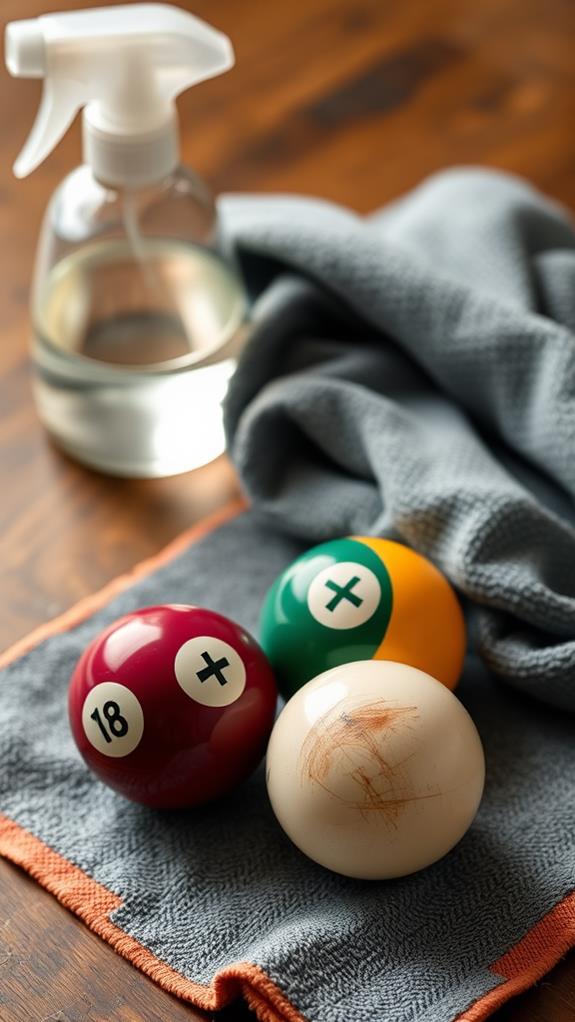
Steering clear of common cleaning mistakes is indispensable to maintaining your billiard balls' quality and longevity. To keep them clean and looking their best, avoid using household cleaners, chemicals, or toothpaste, as these can damage and discolor the ball surfaces. When you clean your billiard balls, never put them in the dishwasher; the extreme heat and detergents can permanently damage them.
It's vital to steer clear of oil-based polishes and waxes, as the residue will transfer to the pool table's felt, affecting gameplay. Additionally, refrain from using abrasive tools like steel wool or scouring pads, which can scratch the surface of the billiard balls. When cleaning, don't soak the balls for more than 10 minutes, as prolonged exposure can cause discoloration and hard-to-remove spots.
To help you remember these important points, here's a table summarizing the common mistakes to avoid:
| Mistake | Consequence | Prevention |
|---|---|---|
| Using household cleaners | Damage and discoloration | Use specialized cleaners |
| Dishwasher cleaning | Permanent damage | Hand-wash only |
| Oil-based products | Residue transfer to felt | Use non-oil-based cleaners |
| Abrasive tools | Surface scratches | Use soft cloths or sponges |
| Prolonged soaking | Discoloration and spots | Limit soaking to 10 minutes |
Maintaining Billiard Ball Appearance
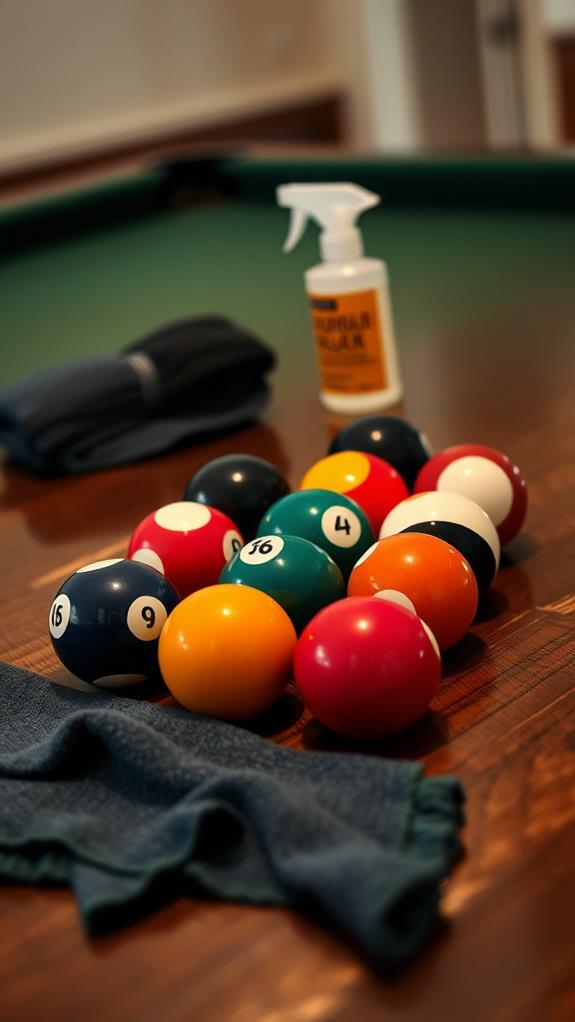
Maintaining your billiard balls' appearance goes hand in hand with proper cleaning techniques. To keep the balls clean and shiny, you'll need to establish a regular maintenance routine. The frequency of cleaning and polishing will depend on how often you use your pool table. For casual players, a monthly cleaning may suffice, while frequent players might need to clean the billiard balls weekly.
To maintain the appearance of your billiard balls, follow these key steps:
- Clean the balls regularly using appropriate cleaning solutions
- Polish the balls after cleaning to restore their shine
- Store the balls properly to prevent dust accumulation
- Inspect the balls for any damage or wear
When you clean the billiard balls, use a microfiber cloth to avoid scratching the surface. Apply a specialized billiard ball cleaner or a mixture of warm water and mild dish soap. Gently rub each ball, paying attention to any stains or marks. After cleaning, dry the balls thoroughly with a soft, lint-free cloth. To enhance their appearance, you can use a ball polisher or hand-polish them with a specialized wax. By preserving this routine, your billiard balls will remain in top condition for years to come.
Professional Cleaning Services
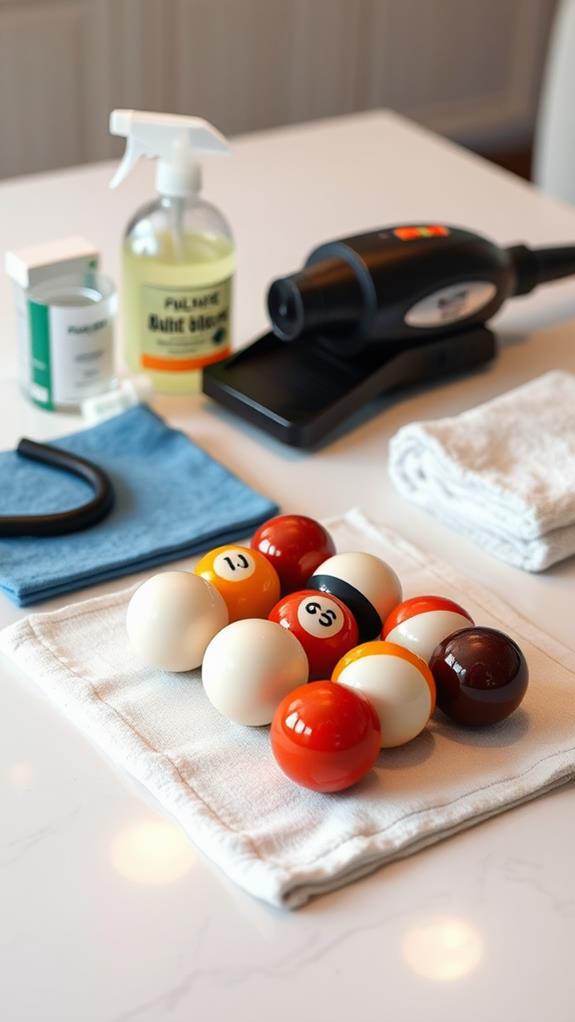
For those seeking the ultimate in billiard ball maintenance, professional cleaning services offer a superior solution. These services utilize specialized products and equipment, including advanced pool ball cleaners and ball washing machines, to thoroughly clean and restore your billiard balls. If you're wondering how often should you clean your balls or if you need to clean them professionally, the answer depends on your usage and the value of your set.
Professional cleaning is ideal for frequent players or those with valuable ball sets. Unlike DIY methods, these services provide an all-encompassing solution that goes beyond basic cleaning. They have the expertise and tools to clean and polish billiard balls to a high standard, extending their lifespan and maintaining ideal playing conditions.
When you hire professionals, you guarantee your balls are cleaned and maintained properly. They'll use industrial-grade cleaners and equipment to remove stubborn dirt, grime, and chalk residue that home cleaning methods might miss. This thorough approach not only improves the appearance of your balls but also enhances their performance on the table, giving you the best possible playing experience.
Storing Billiard Balls Properly
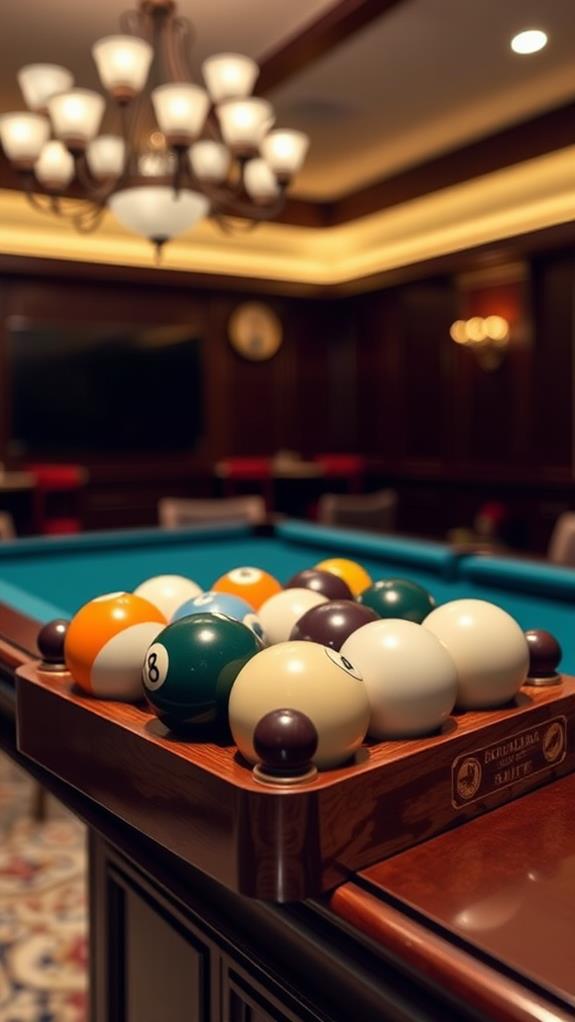
When it comes to storing your billiard balls, protective cases are essential for safeguarding them from damage and environmental factors. You'll want to invest in a high-quality carrying case or rack that can shield your balls from dust, UV light, and potential impacts. Additionally, it's vital to keep your billiard balls in a temperature-controlled environment, as extreme heat or cold can lead to warping, discoloration, or other forms of deterioration.
Protective Cases
After you've cleaned your billiard balls, it is crucial to store them properly. Protective cases are the best way to guarantee your balls remain in top condition for your next billiards game. These cases are designed to shield your balls from environmental factors that can cause damage over time.
When choosing a protective case for your pool table balls, look for one made of durable materials like molded plastic or padded fabric. These materials offer excellent protection against scratches and impacts. High-quality cases often feature individual compartments for each ball, preventing them from rubbing against each other during storage or transport.
- Prevents UV light exposure, which can cause discoloration
- Shields balls from dust and debris in your game room
- Maintains the balls' original shape and playing performance
- Keeps balls organized and easily accessible
Temperature-Controlled Environments
Maintaining a temperature-controlled environment is essential for properly storing your billiard balls. You'll want to keep them in a space where the temperature stays between 60-80°F. This range prevents warping, expansion, or contraction of the balls, which can occur when they're exposed to extreme temperatures.
Avoid storing your billiard balls in areas where temperatures might dip below 40°F or soar above 90°F. These conditions can lead to misshapen balls or surface cracks over time. Additionally, pay attention to humidity levels. Aim for a range of 40-60% to maintain the balls' structural integrity and prevent swelling or shrinkage.
To protect your billiard balls from environmental factors that can cause discoloration and deterioration, consider investing in a climate-controlled cabinet or case. This will help shield them from sudden temperature fluctuations, which can impact the balls' weight and roundness, ultimately affecting gameplay.
Frequency of Cleaning
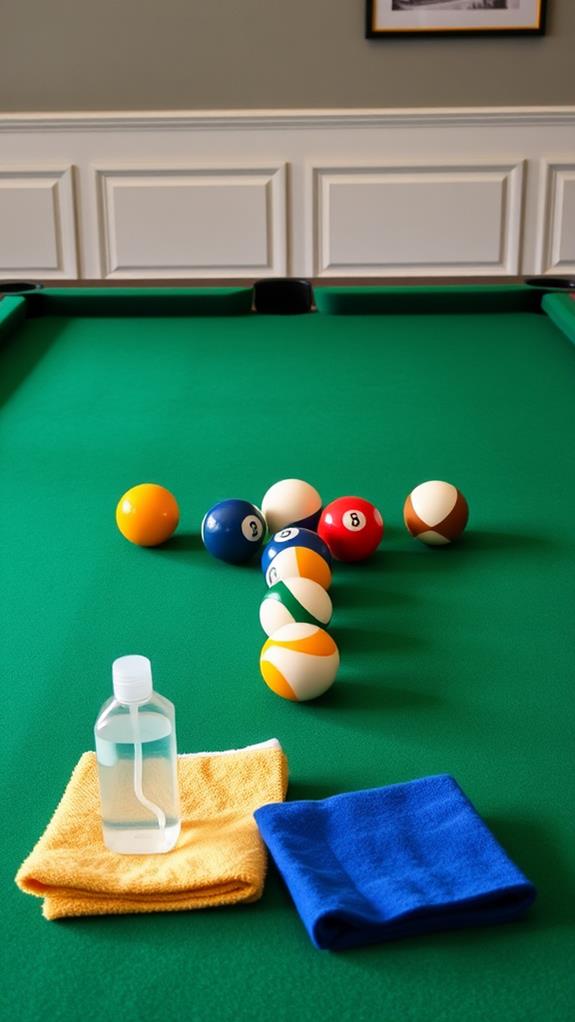
A regular cleaning schedule is essential for keeping your billiard balls in top condition. How often you clean your pool balls depends on how frequently you play. If you're a casual player who enjoys a game once a week, you should clean your balls every other month. For those who play 2-3 times a week or more than three games weekly, monthly cleaning is recommended. Daily players should clean their balls weekly or every other week.
To maintain your billiard balls between cleanings:
- Wipe down balls with a clean microfiber cloth after each game
- Store balls in a cool, dry place
- Avoid exposing balls to direct sunlight or extreme temperatures
- Handle balls with clean hands to prevent oil transfer
Regardless of your cleaning schedule, it's vital to wipe down your balls with a microfiber cloth after every game. This quick maintenance step helps remove chalk, oils, and debris that can accumulate during play. If you notice your balls are becoming worn or damaged, it's time to invest in a new set of balls from a reputable brand. Regular cleaning and proper care will extend the life of your billiard balls and uphold optimal gameplay.
Frequently Asked Questions
What's the Best Thing to Clean Pool Balls With?
You'll want to clean your pool balls with a specialized billiard ball cleaner for best results. These products are designed to remove dirt, chalk, and oil without damaging the balls' surface. If you don't have a specialized cleaner, you can use a mild dish soap and warm water solution. Avoid harsh chemicals or abrasive materials. After cleaning, dry the balls thoroughly with a soft, lint-free cloth. Regular cleaning will maintain your balls' appearance and performance, ensuring smooth gameplay.
How Do You Make Old Pool Balls Look New?
You might wonder if old pool balls can truly look new again. They can! Start by soaking them in a specialized billiard ball cleaning solution or mild detergent. Scrub gently with a microfiber cloth to remove grime and stains. For a professional touch, use an electric ball cleaner and polisher. After cleaning, apply a pool ball polish or wax to restore shine and protect the surface. Remember, regular maintenance is key to keeping your balls looking fresh and extending their lifespan.
Can You Clean Pool Balls With Rubbing Alcohol?
Yes, you can clean pool balls with rubbing alcohol. It's an effective method for removing dirt, grime, and stains without damaging the ball's material. Rubbing alcohol helps restore the balls' shine and smooth surface, improving their performance. It's safer than harsh chemical cleaners, as it evaporates quickly and leaves no residue. However, use it in moderation, as prolonged exposure may dry out the balls. After cleaning, consider applying a gentle polish or wax to maintain the balls' protective coating and long-term condition.
How to Clean Chalk Marks off Pool Balls?
Just as a skilled artist removes unwanted marks from their canvas, you can easily clean chalk off pool balls. Start by using a microfiber cloth to gently wipe away loose chalk. For stubborn marks, dampen the cloth with warm water and mild soap. Rub the affected areas in circular motions, then rinse with a clean, damp cloth. Dry thoroughly with a soft towel. For tougher stains, you can use a specialized billiard ball cleaner, following the product's instructions carefully.





